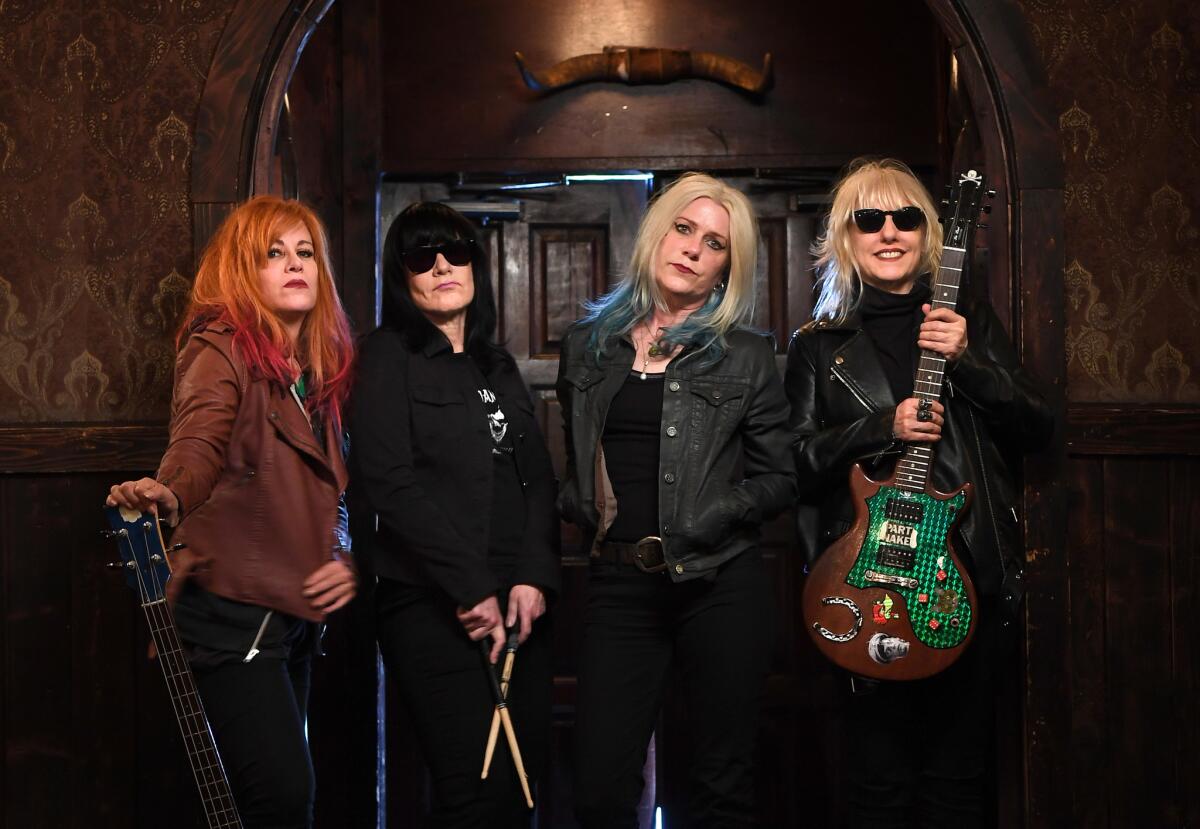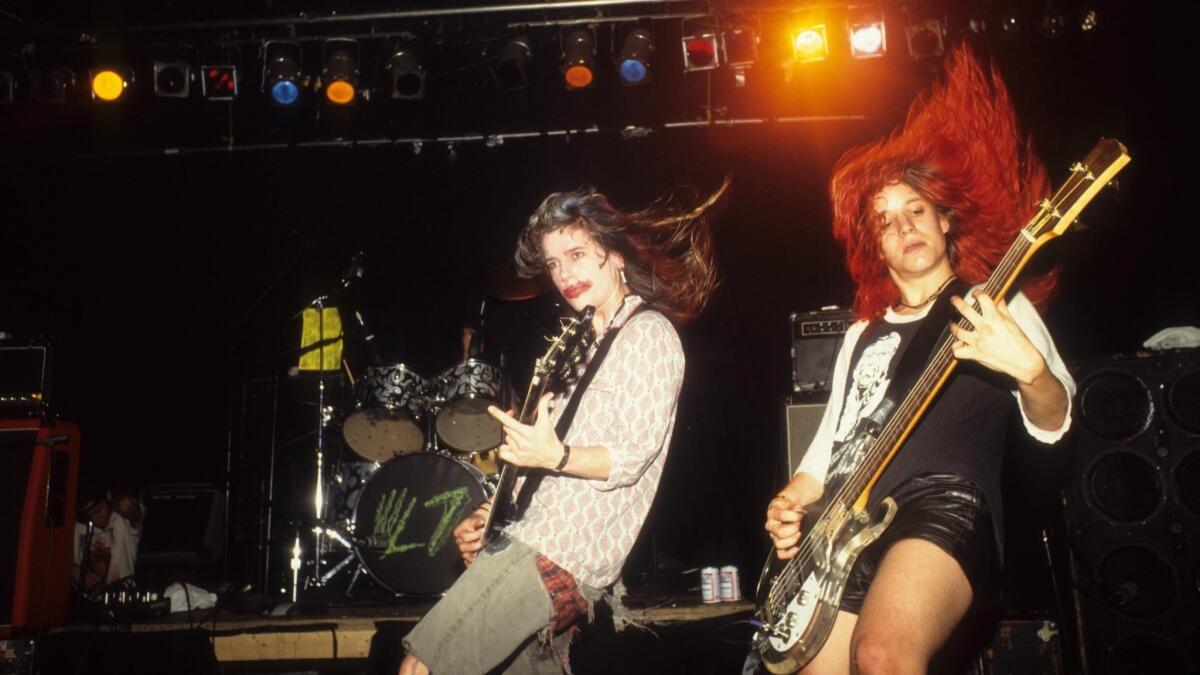L.A. grunge pioneers L7 stage their comeback with a snarl and a wink

- Share via
As she prepared to go onstage one night in Australia in the early 1990s, L7 frontwoman Donita Sparks heard a concert promoter introduce her band by describing their bodies in belittling language that can’t be printed here.
“Look, the #MeToo thing — for me it’s like #WhoHasn’t?” Sparks, 56, said recently of the sexist harassment she and her bandmates endured for years as one of the very few all-female bands in the male-dominated grunge scene. But because there were four of them, Sparks quickly pointed out, “I don’t think any of us ever felt in danger” of the type of physical assault that movement has brought to light.
“Men were kind of scared of us,” she said proudly.
With its sludgy riffs and singsong melodies, L7 found big alternative-era success — opening for Nirvana, scoring an MTV hit with 1992’s “Pretend We’re Dead,” even starting the abortion-rights advocacy group Rock for Choice, which staged high-profile benefit concerts by the likes of Rage Against the Machine and Pearl Jam.
By 2001, though, the band had splintered, driven apart by personality conflicts and diminishing record sales.
So when Sparks called band co-founder Suzi Gardner, 58, in 2014 — she wanted to make a documentary about L7 and needed help gathering archival materials — she didn’t know what to expect.
“Then Suzi picks up and goes, ‘Good eee-vening,’ ” Sparks recalled, laughing as she offered her version of the guitarist’s goofy Dracula impression. “I knew right away everything was cool.”
Five years later, L7 has more than a movie to prove it.
The quartet whose rise and fall was documented in 2017’s “L7: Pretend We’re Dead” is hoping to rise again with “Scatter the Rats,” its first album since 1999, released this month through Joan Jett’s label, Blackheart Records. On Friday, the band — which also features bassist Jennifer Finch, 52, and drummer Dee Plakas, 58 — is set to kick off a North American tour at the Glass House in Pomona.
It’s easy to see why L7 picked this moment to come back. Like Bikini Kill, the influential riot grrrl band that recently launched its own reunion, L7 made its name with bruising yet catchy songs about the appallingly casual predation faced by women.
“Some guy just pinched my ass,” goes the group’s snarling debut single, “Shove,” from 1990. “Drunken bums ain’t got no class.”
Remind you of anyone’s boast about grabbing women by a different body part?
“We like to think that women have come really far, but in many ways, so little has changed from the ’90s — or even from the ’70s,” said Jett, who recruited L7 to back her in 1992 for a Rock the Choice gig at the Hollywood Palladium. “People still hold girls to a completely different standard. And L7 has got something to say about it.”
Yet as timely as the band’s old tunes can feel — not to mention newer ones such as “Dispatch From Mar-a-Lago” — there’s something about how L7 delivers its message that sets this band apart right now.
In an era of intersectional feminism and woke #MeToo activism, Sparks and her bandmates strike a coarser, more freewheeling tone in songs including “I Came Back to Bitch” (“I’m the big dog / You’re simply the bone”) and “Burn Baby,” with its repeated chant of “Lock us up! / Lock us up!”
The women definitely have institutional misogyny on their minds. But they also want to make you laugh, and they’re willing to risk a bit of political incorrectness to do it.
“I think we’re a menace with a wink and a nod,” Sparks said as she sat next to Gardner at a Cuban restaurant in Atwater Village. Her prominent gold tooth glinting in the sun, the singer — who famously threw a used tampon into the audience at England’s Reading Festival in ’92 — added, “We were always slightly threatening, and I think we’ve still got that.”
“We’re not afraid to call things out,” Gardner said.
“But,” Sparks clarified, “without a case of the sinceres.”
Asked what she thinks of today’s liberal youth movement — members of which are sometimes derided as “snowflakes” — Sparks said, “I think they’re in for a world of hurt. You have to pick your battles or you’re going to exhaust yourself.”
“Throwing a conniption because you can’t get the banana-mango vape oil?” Gardner chimed in. “Spare me.”
“The night is long and filled with terrors,” Sparks went on. “And they’re coming for you, snowflake.”

That L7 is contending with these shifts at all comes as a surprise to the band’s members. Sparks, who anticipates each question she’s asked as though it’s sure to be dumber than the last, said she grew up dead-set against rock reunions, at least until she caught the Sex Pistols in 1996.
“They were fabulous,” she said. “Then again, I was wasted.”
More to the point, L7’s breakup wasn’t friendly. Sparks felt abandoned; Gardner spiraled into depression and stashed her guitars beneath her bed, where they sat unplayed while she cared for her ailing mother. The estranged friends lived just blocks from each other in Silver Lake, but they say they never saw each other.
“Actually, I saw you a couple times in your car,” Gardner said as she sipped an iced tea. “One time I even honked.”
“You did?” Sparks asked. “Was I in the Cougar?”
“No, the other car.”
“Oh, wow,” Sparks said. “And you honked at me? Interesting. I probably thought it was one of my exes.”
After patching things up through work on the documentary, L7 started playing live again, albeit without any new songs.
“Writing and recording again — that just seemed impossible at the time,” said Gardner, who described a lengthy effort to regain her confidence as a guitarist.
“But a reunion only has a lifespan of a few years,” Sparks said. “So after we exhausted that, it was like, ‘OK, if we want to keep doing this, we need to make a record.’ ” The L7 movie premiered just days after Donald Trump won the 2016 election, which provided plenty to write about.
“We obviously weren’t going to do the super-earnest thing,” Sparks said. “But we were cool with sticking our necks out. ‘Dispatch from Mar-a-Lago’ is like our ‘Springtime for Hitler.’ ”
That irreverent sense of humor — and L7’s defiantly primal sound — may have kept the band’s comeback at a lower boil than, say, Bikini Kill’s (which opened with four sold-out shows at the Palladium). With some exasperation, Sparks pointed out that L7 has never been invited to play Coachella.
“We thought we were friendly with Goldenvoice,” she said of the company that puts on that cool-hunting mega-festival. “We play other shows for those guys. I don’t know why we haven’t been asked.”
Yet Sparks and Gardner say they’re unwilling to play by the rules of modern pop stardom, in which an artist’s entire life serves as fodder for social media.
“You don’t need to see me weed-whacking, OK?” Gardner said.
“Privacy is cool,” added Sparks. “Years ago, people were curious about our sexual orientation, and I never wanted to reveal that because I felt like I wanted to be a role model for whoever wanted me to be a role model.” With a laugh — and with far saltier words — she said she wanted everyone in L7’s audience to think they could have sex with her.
“I’m an open field,” she said. “Anybody’s got a chance at this.”
Twitter: @mikaelwood
More to Read
The biggest entertainment stories
Get our big stories about Hollywood, film, television, music, arts, culture and more right in your inbox as soon as they publish.
You may occasionally receive promotional content from the Los Angeles Times.











